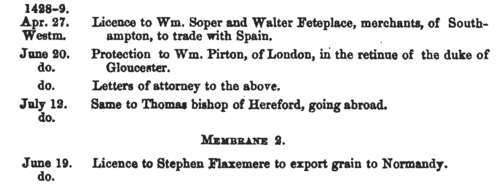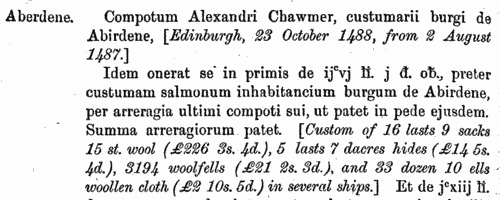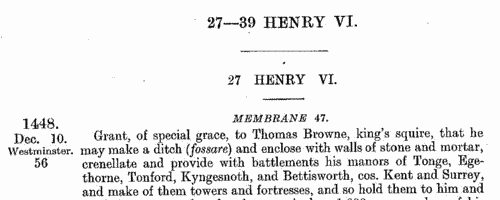Burne Surname Ancestry ResultsOur indexes 1000-1999 include entries for the spelling 'burne'. In the period you have requested, we have the following 389 records (displaying 31 to 40): Single Surname Subscription | | | Buying all 389 results of this search individually would cost £2,062.00. But you can have free access to all 389 records for a year, to view, to save and print, for £100. Save £1,962.00. More... |
These sample scans are from the original record. You will get scans of the full pages or articles where the surname you searched for has been found. Your web browser may prevent the sample windows from opening; in this case please change your browser settings to allow pop-up windows from this site. Close Rolls
(1429-1435)
The close rolls of the 8th to 13th years of the reign of king Henry VI record the main artery of government administration in England, the orders sent out day by day to individual officers, especially sheriffs of shires: they are an exceptionally rich source for so early a period. There is also some material relating to Wales, Scotland, Ireland and the English possessions in France. Also included is the Exchange Roll of 1424 to 1434, of licences to transmit sums of money out of the realm.BURNE. Cost: £4.00.  | Sample scan, click to enlarge

| The English in France
(1453)
King Henry VI of England (one of the grandsons of Charles VI of France) claimed the throne of France (and quartered the fleurs-de-lis of France with the lions of England on the royal standard) as had his predecessors since Edward III, as descendants of Philip IV of France. The English had real power or influence in Brittany, Normandy, Flanders and Gascony, and actual possession of several coastal garrisons, in particular Calais, where the French inhabitants had been replaced by English. Henry VI came to the throne only seven years after his father had trounced the French at Agincourt; but his cousin, Charles VII, who became king of France in the same year, spent his long reign rebutting the English king's claim to his throne by territorial reconquest and consolidation. The English administration kept a series of records called the French Rolls. On these are recorded royal appointments and commissions in France; letters of protection and safe-conduct to soldiers, merchants, diplomats and pilgrims travelling to France from England and returning, and to foreign legations. There are also licences to merchants to export to the Continent, and to captains to transport pilgrims. As Henry VI's reign progressed, and the English grip on northern France loosened, the French Rolls also increasingly include entries concerning the ransoming of English prisoners.BURNE. Cost: £6.00.  | Sample scan, click to enlarge

| Yorkshire Testators and Legatees
(1426-1466)
Wills and testaments from the diocese of York (Yorkshire, Nottinghamshire, Hexhamshire, Lancashire north of the Ribble, and southwest Westmorland) registered at York. Richmond and Southwell archdeaconries had their own lower probate jurisdictions, so the wills registered at York are predominantly from the East and West Ridings and the eastern part of the North Riding of Yorkshire. In theory, wills dealt with real property and testaments with personal property, but the distinction hardly applies in practice: most of these wills are in Latin, but some are in English. Being before the Reformation, they commonly start with benefactions to churches, chantries, chapels, &c., and with provisions for the burning of candles ('lights') and saying of masses.BURNE. Cost: £4.00.  | Sample scan, click to enlarge

| London and Middlesex Feet of Fines
(1198-1485)
Pedes Finium - law suits, or pretended suits, putting on record the ownership of land in London and Middlesex.BURNE. Cost: £4.00.  | Sample scan, click to enlarge

| Norfolk Feet of Fines
(1307-1485)
Pedes Finium - law suits, or pretended suits, putting on record the ownership of land in Norfolk. These abstracts were prepared by Walter Rye.BURNE. Cost: £4.00.  | Sample scan, click to enlarge

| Officers and tenants of the Scottish crown
(1488-1496)
In 1887 the 10th volume of Rotuli Scaccarii Regum Scotorum, or The Exchequer Rolls of Scotland, was published in Edinburgh as part of the Scottish Series of Chronicles and Memorials. The main text is a transcript in extended Latin, but with some passages reduced to an abstract in English (in italics), of the rolls of the Scottish royal exchequer from 19 June 1488 to 12 October 1496 (rolls cclxxviii to ccxcv, old numbers ccxciii to cccix). This more or less continuous series alternates between accounts of the Ballivi ad Extra (royal chamberlains, lessees of lordships, rangers of wards, receivers &c) and those of the Custumars (receivers of customary payments and similar revenues) and bailies (bailiffs) of burghs (boroughs). In all, they give a summary description of all these sources of royal revenue - and not only mention the payers and receivers in general, but also refer to many occasional payments to and receipts from individuals hardly otherwise found in the surviving records. An appendix (pages 629 to 763) of rentals of royal property throughout Scotland in the same period gives a rich harvest of personal names; and another (764-772), an Index in Libros Responsionum, lists persons to whom sasine (seisin) was granted in 1492 to 1496.BURNE. Cost: £4.00.  | Sample scan, click to enlarge

| Inhabitants of Leicester
(1327-1509)
The Corporation of Leicester commissioned the publication (in 1901) of extracts from the borough archives of 1327 to 1509, edited by Mary Bateson. This volume brings together several important sources: a coroner's roll of 1327; the merchant gild rolls; tax returns; court rolls; rentals; mayoral accounts, &c. All the Latin and French texts are accompanied by English translations. Not all the tax rolls surviving for this period are printed: but full lists of names are given for tallages of 1336 (pp. 34-40); 1347-8 (69-71); and 1354 (93-99); subsidy rolls of 1492 (331-334) and 1497 (351-353); and a benevolence roll of 1505 (370-374). There is a calendar of conveyances (388-446), and a list of mayors, bailiffs, and other officials (447-462); and, finally, entrants into the merchant gild
from 1465 to 1510. Membership of the merchant gild was by right of inheritance (s. p. = sede patris, in his father's seat), or by payment of a fee called a 'bull' (taurus). Those marked * paid their bull, and were thus, by implication, not natives, or at least not belonging to gild merchant families. By 1400 membership of the gild merchant had become the equivalent of gaining freedom of the borough (being a free burgess): but thitherto the two were not necessarily the same, and some of the merchant gild members were not resident in the borough, merely traded there.BURNE. Cost: £4.00.  | Sample scan, click to enlarge

| Recipients of grants of land by the Crown; and other grantors and grantees
(1427-1516)
Grants of land by the Crown were enrolled on the Charter Rolls: but this series of records was also used by other magnates and religious houses as a way of having their own deeds inspected, confirmed and registered. It will be seen from this that some of the material described in these inspeximuses dates back to a considerably earlier period. In addition, there is an appendix of fragments of charter roll material from 1215 and 1286 to 1288. The royal grants enrolled relate not only to land, but also to various privileges that were part of the royal prerogative.
Most of the material is from England, the remainder relating to Ireland, Wales and possessions in France, but virtually nothing from Scotland, which was an independent kingdom at this period.BURNE. Cost: £4.00.  | Sample scan, click to enlarge

| Tenants of Somerset chantries
(1548)
Chantries were established to perform services for the souls of their founders and other faithful dead, including annual obits and anniversaries at which alms were usually distributed. The chantries could be at an existing altar in a parish church, a new altar in a side chapel of an existing church, in a new chapel in the churchyard or some miles from an existing church: few were founded before 1300, and most date from 1450 to 1500. Hospitals were places provided by similar foundations to receive the poor and weak; there were also religious guilds, brotherhoods and fraternities, and colleges (like large chantries at which three or more secular priests lived in common). An Act of Parliament of 1545 gave king Henry VIII the power to dissolve such chantries, chapels, &c., the proceeds to be devoted to the expenses of the wars in France and Scotland. Commissioners were appointed 14 February 1546 to survey the chantries and seize their property, and in 1548 the commissioners in Somerset produced this survey and rental. The individuals named are the tenants whose rents provided the chantry's income: occasionally an incumbent is named. The survey was edited by Emanuel Green for the Somerset Record Society, and published in 1888.BURNE. Cost: £4.00.  | Sample scan, click to enlarge

| Freemen of London
(1540-1550)
The long series of mediaeval registers and books of admission of the freemen of London was destroyed by fire in 1786. Thirty surviving charred leaves were gathered together and rebound, becoming Egerton MS 2408 in the British Museum. The order is jumbled and generally speaking none can be dated with certainty, although all belong to the very end of the reign of Henry VIII and the start of the reign of his son, Edward VI. These are pages from the admission books. Each entry here usually gives the name of the person admitted to the freedom; his father's name, address and occupation; his entitlement to the freedom, usually by having served out an apprenticeship to a citizen, naming the master and his trade. Then there may follow a cross-reference to M. or N., being two volumes of another set of official books denoted by the letters of the alphabet, and following each other in chronological sequence, which evidently gave details of entries into apprenticeships. These other books no longer exist: but the dates given for entry do identify the start of the apprenticeship, and so give by implication a date for the eventual admission to freedom. In the margin is the name of the city ward and the total of the fee and fine paid on admission.BURNE. Cost: £4.00.  | Sample scan, click to enlarge

|
Research your ancestry, family history, genealogy and one-name study by direct access to original records and archives indexed by surname.
|












